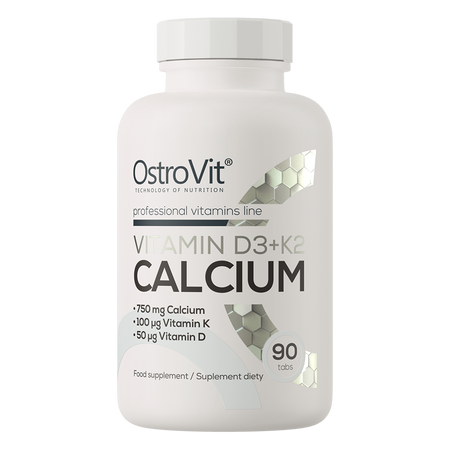Calcium
Calcium is an important chemical element that is the building material of teeth and bones. It can prevent painful muscle spasms, as well as take part in proper blood clotting. Calcium deficiency in the body can contribute to the occurrence of osteopenia and osteoporosis and among children it can also lead to growth disorders. Therefore, an adequate supply of the element along with a daily diet is extremely important.
What is calcium?
Calcium is a mineral component present in the human body, which is necessary for the proper functioning of the system. It is a chemical element with the symbol Ca, which the body cannot synthesize on its own.
Nearly 99% of calcium is located in teeth and bones, although the compound is also present in body fluids and soft tissues. In bones, the macroelement is present in bound form. In turn, in the cellular and extracellular fluid, the element is present in the form of ionized calcium.
Calcium absorption takes place in the small intestine and its bioavailability is dependent on other compounds.
Calcium bioavailability
The absorption of calcium in the small intestine is supported by vitamin D, which facilitates the transport of the compound into the blood and then to the body's cells. In addition, the bioavailability of calcium also increases magnesium, which affects the transport of the element and vitamin K and lactose.
In turn, compounds such as oxalic acid, phytic acid, dietary fiber or large amounts of fat and animal protein, reduce the availability of calcium in the body.
Phosphorus also plays an important role in maintaining proper calcium management and actually the appropriate ratio of calcium to phosphorus, which should be 1:1.
Sources of calcium in the diet
Calcium is associated primarily with milk. And that's good, because it's a great source of the element. However, this compound can also be found in other foods, such as:
- sunflower seeds,
- sesame seeds,
- poppy,
- dairy products i.a. ripened rennet cheeses,
- tofu,
- dried figs,
- kale,
- nuts,
- carob,
- green vegetables.
Mineral waters are also a valuable source of macroelement.
Calcium properties
Calcium primarily has a building function, is responsible for the formation of teeth and bones. The element also participates in many metabolic processes, participates in the formation of hormones, the process of cell division and specialization, as well as in nerve conduction. Calcium is responsible for the activation of enzymes and its correct concentration determines the amount of released specific neurotransmitters.
The element also helps in the proper functioning of muscles and is necessary for the hydrolysis of ATP, i.e. an energy carrier. Moreover, it can regulate the nervous system, is responsible for muscle contractions and is involved in the blood coagulation process. It is needed for the formation of platelets and facilitates the production of fibrin.
It is a macroelement necessary for the proper functioning of the heart and circulatory system, which may also be important in lowering blood pressure.
Adequate calcium intake can reduce the risk of developing osteoporosis, which makes bones porous, brittle and prone to fractures.
Calcium requirement
The need for calcium depends on age, sex and physiological state. During the first six months of life, 200 mg of the element should be supplied to the infant's body per day, while children up to three years of age have a demand of 700 mg / day.
In adolescence, due to the increased needs of the body, the appropriate daily supply of the element is 1300 mg, while among adults the demand is 1000-1200 mg per day.
Pregnant and lactating women should also pay attention to the adequate supply of calcium, because then the demand for this macroelement increases.
A well-balanced, correct diet is able to cover the need for calcium and ensure a sufficient supply of the element in the body. However, in some situations, e.g. among the elderly, when the absorption of the element is reduced, it is recommended to consider additional calcium supplementation.
Calcium deficiency
Calcium deficiency may be caused by too low supply of the element in the diet, but also by poor absorption of the compound or excessive excretion in the urine. Macronutrient deficiency can also be associated with hormonal disorders.
A decrease in calcium, called hypocalcaemia, may contribute to nervous system dysfunction and an increase in blood pressure. In children, on the other hand, growth disorders, rickets and a decrease in peak bone mass can be observed during the period of intensive growth.
Deficiency of the component causes bone demineralization and softening, and consequently leads to the development of osteopenia and osteoporosis.
Hypocalcemia also interferes with blood clotting, which prolongs bleeding after injury, and also promotes bruising and hemorrhages.
The first sign of calcium deficiency may be muscle cramps, joint pain, tingling and numbness of the limbs. Insufficient supply of the element for a long time can cause sleep disorders, nosebleeds, as well as heart rhythm disorders and increased susceptibility to bone fractures. In extreme cases, advanced caries and tooth loss occur.
Excess calcium in the diet
Not only calcium deficiency is a threat to the proper functioning of the body. Also, an excess of the element, called hypercalcemia, can be dangerous for the whole system.
The first sign of excessive calcium supply is constipation, nausea and lack of appetite. In addition, hypercalcemia can manifest as excessive sleepiness, weakness, concentration problems, increased thirst and more urine output. As a result, it can lead to the formation of kidney stones and reduce the absorption of iron and zinc.
Increased levels of calcium in the blood may occur in people with hyperthyroidism, primary hyperparathyroidism or excess vitamin D.

